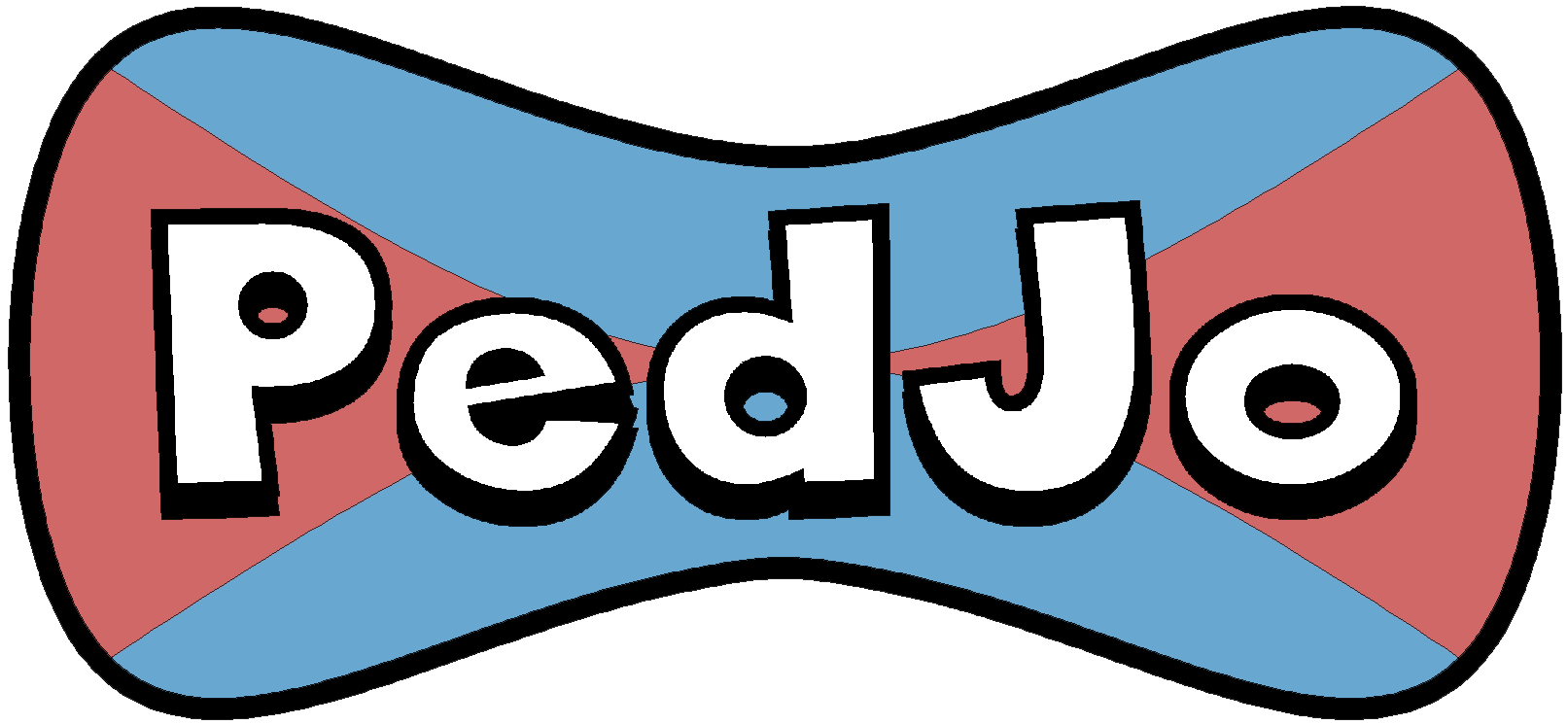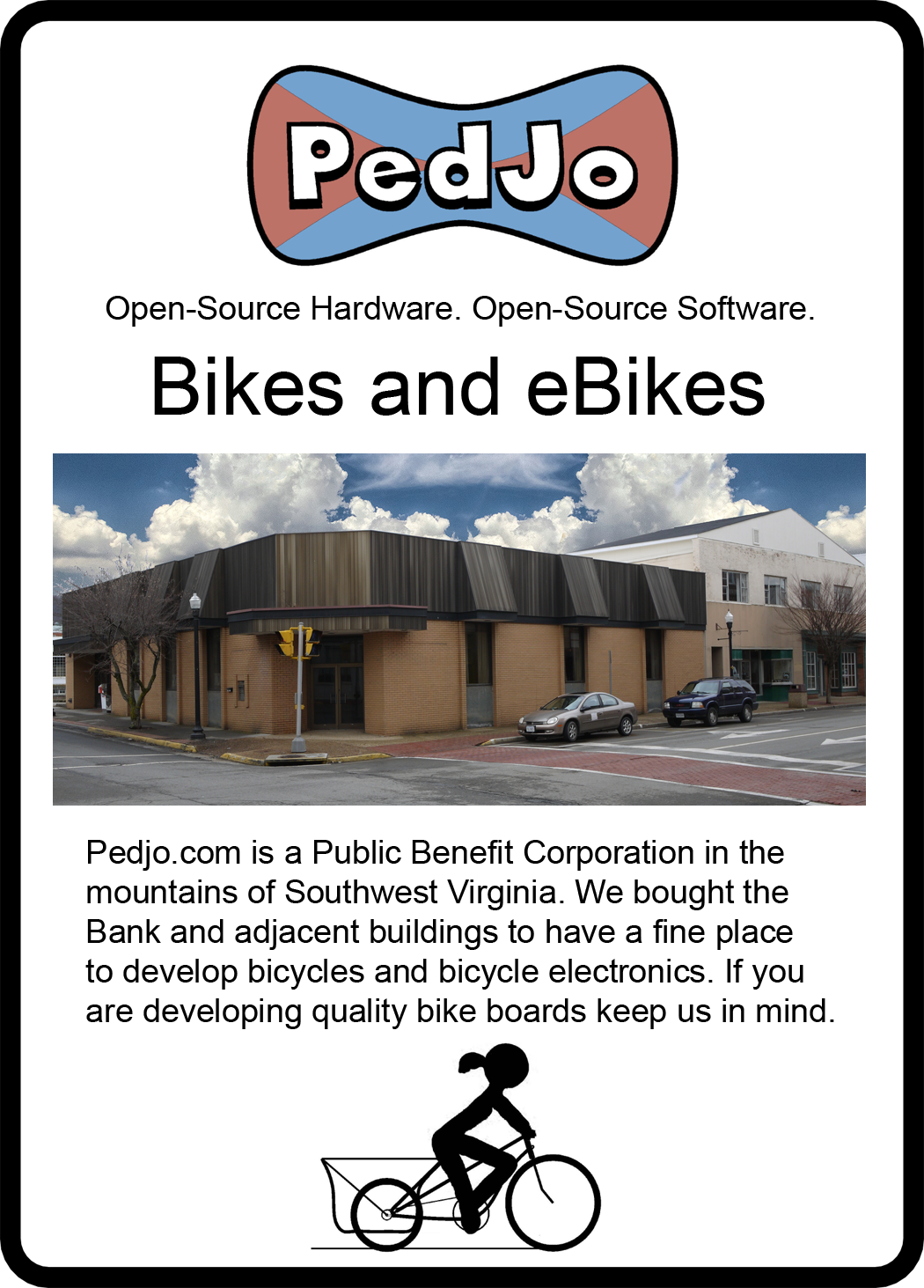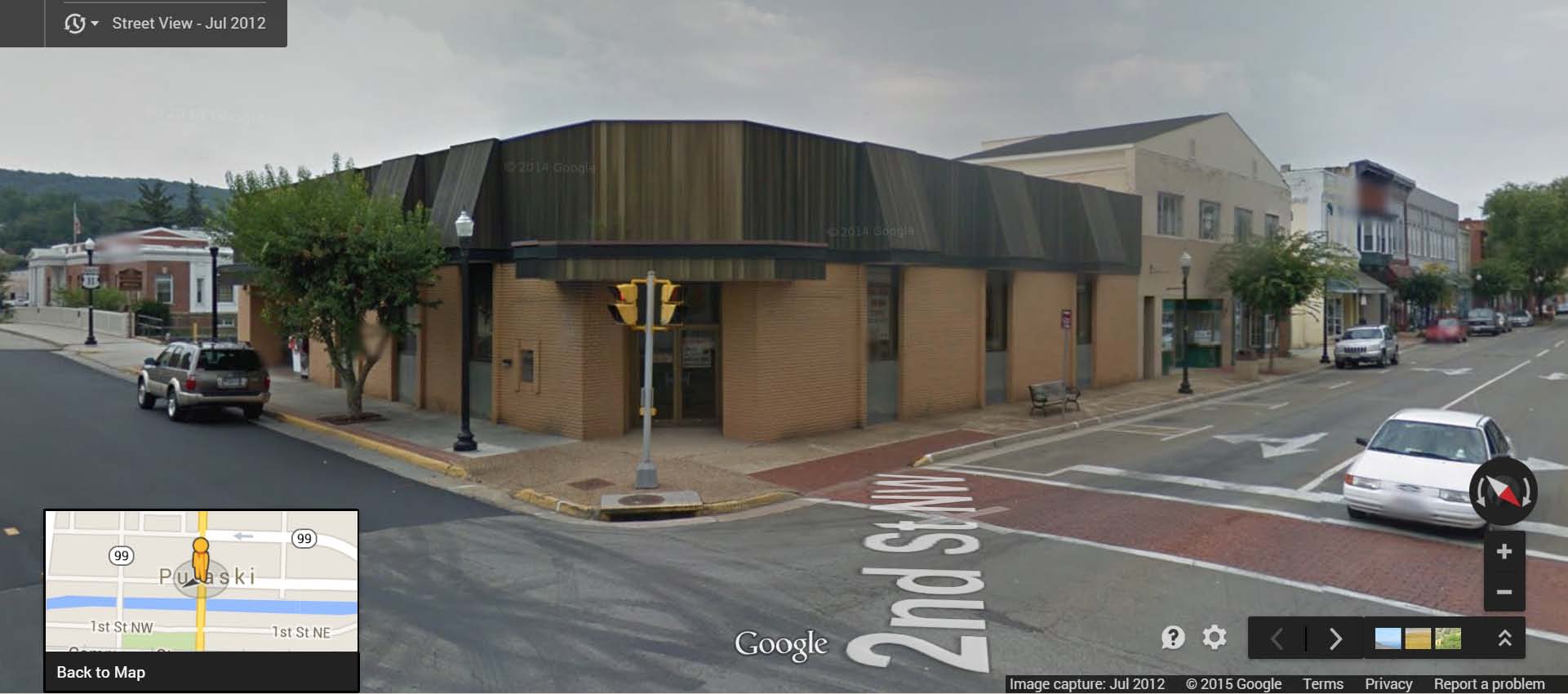
For Town of Pulaski Decision-Makers.
This page exists to provide information to Town of Pulaski decision-makers.
Later, our official web site will appear at this location.
Since some important Town decision-makers have received paper copies of information that do not include the links and other information contained here, I wrote this page to fill in the gaps.
A short pdf introduction to our company and its objectives can be found here.
For those who want to know more about why we are so enthusiastic about bicycles, the pdf summary here illustrates how bicycle and bicycle design history relate to our work.
The Signet Bank Building.
Pedjo is now in the process of buying the Bank and two adjacent storefronts – a complete stand alone subsection separated from other buildings on the block, located at 1, 15, and 19 W. Main, Pulaski, VA.
You can see the property with a Google Street-view perspective and navigate around it by clicking on the image or by clicking here.
Tesla Electric Car Manufacturing Compared to Pedjo eBike Makers.
Tesla Motors' market capitalization is $35 billion; General Motors, $55 billion. Tesla’s capitalization is now 64% of GM.
That is one way a company can produce 22,400 units a year, as Tesla did in 2013.
There is another way to get the same volume of production. It is called "The Open-Source Maker."
Let me illustrate: Allowing for a normal work week and national holidays, there are 249.7 available work days. To make 22,400 units a year, given those available days would require that 89.7 units a day be built in Tesla's plants. That is conventional manufacturing.
Instead, with bicycles the same volume can be achieved with a tiny footprint using Open-Source Makers.
If a company like Pedjo (instead of using conventional manufacturing) supplies small workstations to 30 independent Makers throughout the United States (each averaging a modest production of 3 bikes a day) then a Pedjo-like approach would result in 90 bikes daily and 22,400 annually – the same unit volume that Tesla had.
In sum, large results using a small capital outlay and very modest space at each Maker town or city.
Indeed, no single conventional manufacturing facility of any kind anywhere.
This is how Makers differ from Manufacturers. In a fashion, Open-Source Makers resembles a Wikipedia-like approach – gathering the contributions of many to produce excellent results.
With the onset of Makers, changes are occurring at a wildly fast pace. So fast that those such as Jeremy Rifkin (a Wharton economist) believe that the maker movement is “as significant as the shift from agriculture to the early industrial era.” In any case, Pedjo will be there to see that innovative bikes are the norm, not the exception.
Subject to the Signet Bank property coming into my hands and my being granted a certificate of occupancy, I have arranged to run an ad in the May 26, 2015 issue of the widely-read national magazine: Make. This quarter-page, understated, introductory ad is intended to ferret out people likely to participate in the company's performance. The following is a preliminary mock-up for it. A sharper picture and other changes will be made.
It will bring attention to Pulaski:

The benefits to the consumer are huge. Fifty-one percent of commuters live within 10 miles of their workplace – a distance that can be easily covered in less than 31 minutes on a pedal-assisted eBike averaging 19.5 mph. Thirty percent of commuters are so close that they could commute in less than approximately 15 minutes.
You can plug it in anywhere, not just at special charging stations. It is plainly obvious that the footprint of a pedal-assisted eBike, ecologically and financially, is far, far less than an electric car.
A pedal-assist eBike operating at 17.3 watts per mile is twenty-two times more efficient than a 2013 Tesla Model S that averages 380 Watts per mile.
You can travel on an eBike with confidence that its adverse ecological influence is small relative to other common forms of transportation – even electric or hybrid cars.
The eBikes that we design are a fine place to start before jumping in and spending a huge amount of money either on a plug-in or hybrid car, or on a large solar/wind system. They provide proof of concept on a small scale, before considering bigger steps.
Bikes for folks.
Biking should be an activity, not always a sport.
The vast majority of bikes now available are based on the precept that if it is a good racing bike or a fine mountain bike, it should also be a good all-around bike that one can use for many purposes. But is that so?
Consider the family car. Does yours differ from a Grand Prix Race Car?
The analogy carries to the bicycle.
Mimicking special purpose racing bicycles or mountain bicycles deprives the common user of a huge number of opportunities. Just as there are family cars, we need family bikes – bikes designed to be the ultimate family machine ... innovative, functional, and fun for the family ... a normal part of daily life.
As our bikes roll out, I believe you too will agree. Indeed, we expect you will be perplexed that for too long, too many bikes were insufficiently fun and useful for the day-to-day user.
Take for example a delicate lady who is committed to pedaling, but does not want to make an excessively athletic exertion. Add a pedal-assist electric hub motor and she can outpace the fastest conventional bike and have a fine time scooting along.
The conventional bike user, such as myself, too is not left out. Pedjo frames and accessories are intended to leave their mark – with or without a motor.
At least that is what Pedjo intends to accomplish. That is why we are in business.
Health.
Treating biking as an activity rather than an endurance sport has a big payoff.
Low doses of exercise (fewer than 150 minutes a week, 21 minutes a day) can be quite enough. Evidence increasingly indicates that if the objective is to reduce all-cause mortality, high doses of exercise "are not only unnecessary but may also erode some of the remarkable longevity benefits conferred by lower doses."
This is made plain in the Journal of the American College of Cardiology's Copenhagen City Heart Study article and is reported in the popular press (Forbes and BBC).
On an eBike averaging 17.5 or 19 mph, less than six or seven miles a day can be sufficient to reach this upper limit.
Just normal shopping runs and visiting friends – not necessarily competitive biking – increasingly seems to be a reasonable way to get optimum health benefit.
Great "Finishers"
Because I admire the following, I include this section for your consideration:
From 1943 to 1946, ENIAC, the world’s first programmable electronic computer, was developed.
One of the key players was Jean Jennings Bartik. She correctly points out the importance of the “finisher.”
“We were given responsibility because we were good finishers. ... One thing I want to tell you. Why was I very successful; and Betty, very successful? And we were very successful …
"Well, I think, it’s because we were great finishers. … You know how most people like to do the fun part of a job. But then, for all these nasty little details, they don’t like to do them. …
“Well, Betty and I were great finishers. And when she finished a job, she had thought of everything, absolutely everything, and it was ready to go.” (source)
In this video Jean Bartik is 80 years old. You can hear her making the same point in the video. But if you have the time and would like to hear her views from childhood through adulthood, they can be found in the full video here.
Her day-to-day, sunshine-or-rain approach made her life and work memorable and important.
Her vitality similarly comes through in the following poem she wrote.
Fortunately, it is also included in the Youtube video here.
The Technical Camelot
There once was a congenial spot
Where ideas flowed so free-i-ly
And designs were done so speed-i-ly
Where all of them forgot
Frontiers weren’t pierced so eas-i-ly
No one believed in Not
In Technical Camelot
Sure at Pedjo we start with what we feel are important designs and objectives, but it will always be the day-to-day Bartik variety of “finishing” that is the key to her and our Camelot.
A Pedjo derivation.
Ped refers to pedaling.
Jo is a Scot word for sweetheart, darling, or a beloved one.
In the 16th century its origin: joy
Also a nickname for "Josephine" or "Joseph".
Inferred combinations:
Pedaling Sweethearts or a combination of any of the above. A reminder that the objective is upbeat, special, memorable, friendly, joyful, and onward ...
